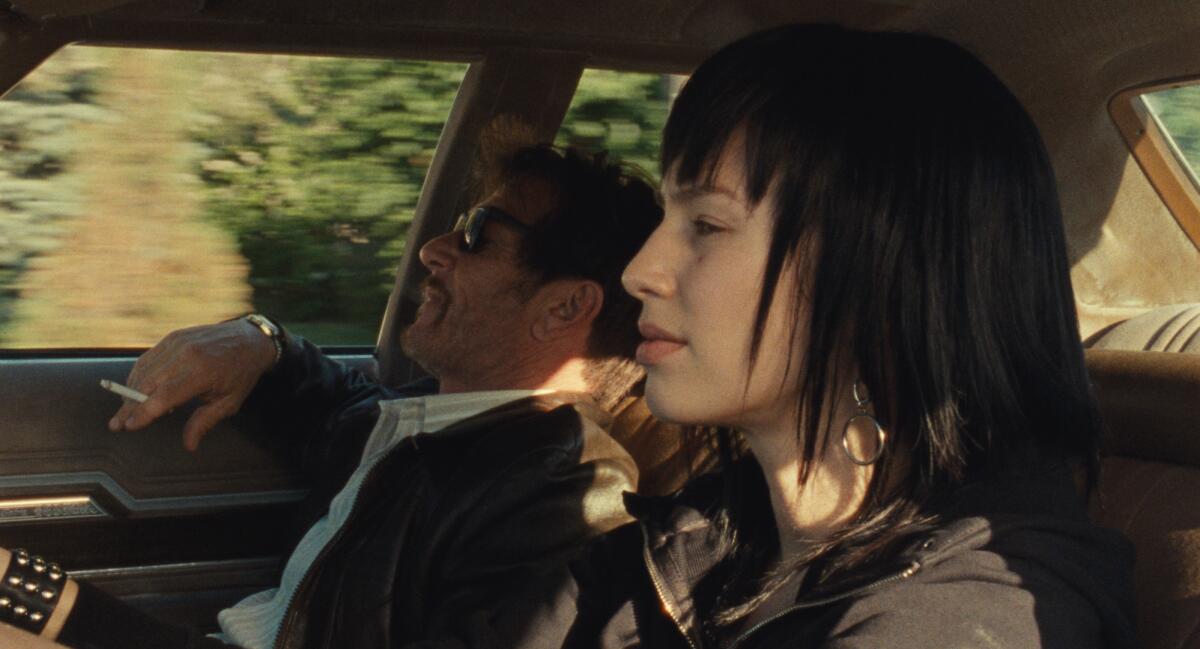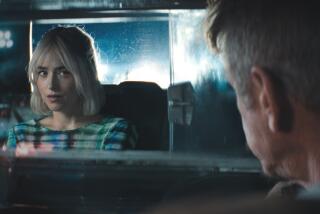Review: Sean Penn’s father-daughter drama ‘Flag Day’ sputters

The Times is committed to reviewing theatrical film releases during the COVID-19 pandemic. Because moviegoing carries risks during this time, we remind readers to follow health and safety guidelines as outlined by the Centers for Disease Control and Prevention and local health officials.
In “Flag Day,” Sean Penn directs himself as an inveterate criminal opposite his daughter Dylan as the child determined to love him. It’s about ill-considered decisions and tarnished hope, and that’s only what the characters play out. The film itself, an adaptation of journalist Jennifer Vogel’s memoir “Flim-Flam Man,” about the psychic legacy of her dishonest dad, is the other iffy parenting job.
Since he first stepped behind the camera for the brooding, raw “The Indian Runner” in 1991, Penn’s films as director have always fringed his career like a cloud that’s equal parts atmospheric, hazy and readily fanned away. When the deeply felt survival drama “Into the Wild” arrived in 2007, a turning point seemed at hand. But then nine years later came the tone-deaf, posturing aid-worker romance “The Last Face,” and one wondered if even what was admirably gritty and unflinching about Penn’s directorial energies had been lost.
“Flag Day” is at least partly a corrective. Named for the patriotic spot on the June calendar that’s also the birthdate of Penn’s untrustworthy character, John, the movie represents a more compact, and initially welcome, case of indie muscle-flexing for him as director and actor. (It’s the first time Penn has directed himself onscreen too.) But as it stretches out, it also thins, its Malick-meets-Cassavetes ambitions never rising above clichés of technique and melodrama. As it turns out, a rocky combination of lyrical aims and tonal volatility ultimately leads astray both the idealistic, family-deserting bank robber Penn plays and the well-intentioned filmmaker struggling to mix myth, crime and a daughter’s heartache into a cohesive work of feeling.
Starting in 1992, when a failed counterfeit scheme of John’s is explained to his estranged adult daughter, Jennifer, by a sympathetic FBI agent (a one-scene Regina King), the movie turns back to 1975 to start filling in the details of life lived in the swirl and shadow of a scheming dreamer. To young Jennifer’s adoring eyes (Jadyn Rylee’s in the childhood scenes), father’s verve, cultural tastes (Chopin!) and doting attention are nourishment. His lies and nervy disappearances — and being left with younger brother Nick (Beckam Crawford) to suffer with their increasingly depressed and alcohol-dependent mother, Patty (Katheryn Winnick) — are the price Jennifer pays for those flashes of us-against-the-world love.
Early on, when cinematographer Danny Moder’s 16mm imagery is at its surest evoking the warmth, shakiness and blur of a remembered past, and Penn is breezily commanding the screen, you can forgive the clunkiness in the Jez Butterworth and John-Henry Butterworth screenplay — poorly dramatized scenes, Jennifer’s overbearingly poetic narration — for mood-setting earnestness.
When Dylan Penn takes over as Jennifer in adolescence and onward, however, once a rebellious, searching Jennifer forces a reunion with John, the movie’s unsteadiness intrudes, like an outline for something powerful instead of the real deal. Scenes that aren’t meandering in a fog of awkward dialogue or making their points too ham-fistedly (like Jennifer’s turn toward journalism) are instead devolving into yelling and tears like a fast-acting powder. The montages, meanwhile, set to new songs by Cat Power, Glen Hansard and Eddie Vedder, mostly feel like pacing shortcuts instead of the resonant thematic refrains Penn clearly wants them to be. Small turns by great actors — Josh Brolin, Dale Dickey, Eddie Marsan — add welcome color but aren’t enough.
Hovering over everything, of course, is the unfulfilled goal that this bittersweet, tragedy-laced story of father/daughter turbulence would be a stirring showcase for papa Penn and Dylan. (And tangentially, son Hopper Penn, who plays adult Nick.) Instead, the younger Penn — her stillness more effective than her exertions — appears hamstrung from a complete portrayal by the choppy execution and formulaic qualities around her. Even the Oscar-winning Penn lets his characterization — more subtly vulnerable early on — succumb to what’s expected, a shame considering that’s when his daughter is his scene partner. Seeing them flail in so personal a project makes, in its own way, for a kind of alternative emotional layer considering the material, but not enough to keep “Flag Day” from being a misfire.
'Flag Day'
Rated: R, for language, some drug use and violent content
Running time: 1 hour, 48 minutes
Playing: Starts Aug. 20 in general release
More to Read
Only good movies
Get the Indie Focus newsletter, Mark Olsen's weekly guide to the world of cinema.
You may occasionally receive promotional content from the Los Angeles Times.










